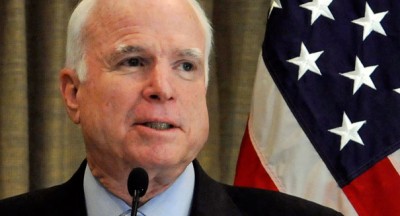
image credit politico.com
The military industrial complex is alive and well on Capitol Hill. An analysis by David Kravets of Wired shows that members of the US Senate’s Foreign Relations Committee who voted to authorize President Obama’s planned attack in Syria were more likely to receive campaign contributions from defense contractors.
Perhaps not surprisingly, the biggest recipient of cash from defense and intelligence companies was Sen. John McCain (R-Arizona), who received $176,300 in contributions from military contractors and their employees since 2007. McCain has been a vocal advocate of intervening in favor of the Syrian rebels.
The analysis showed that the average senator who voted for the Syria strike received 83 percent more in contributions from defense contractors than those who voted against it. Senators who voted to bomb Damascus received an average of $72,850 from the contractors. Senators who voted against it received an average of $39,770.
The cruise missiles that the US military could fire at targets in Syria cost around $1.5 million each, and the GPS-guided bombs that would be dropped by the B-2 bomber cost $50,000 apiece. It’s easy to see how the cost of even a modest military engagement can quickly add up.
Attack Could Cost Billions
The attack on Libya in 2011 cost taxpayers around $1.5 billion. NBC News reported there is “doubt about what the operation” in Syria “could cost and even about who might for pay for it.”
A Call To Action For Those Who Care About The Future Of The United States.
Rep. Ileana Ros Lehtinen, a Republican from Florida, said at a House hearing, “Even a limited engagement — if it ends up being only limited — could potentially cost taxpayers billions. With members of the Arab League so eager for U.S. participation, have they offered to offset any of the costs associated with this action?”
Secretary of State John Kerry told her the Arab League is willing to foot some of the bill, although he did not provide details.
Dov Zakheim, a senior advisor at the Center for Strategic and International Studies, said the costs could add up quickly.
“If you look at Libya, we spent something north of $1.5 billion. In that case we were ‘leading from behind.’ Here we would be leading in front,” Zakheim said. “So when the chairman of Joint Chiefs talks about billions of dollars, he’s probably talking closer to $5 billion, and maybe more, just depending on how long you go on, how may targets you go after and how many times you have to go after the same targets.”
Zakheim added, “These things don’t just run two weeks, three weeks, four weeks. You have to deal with a lot of targets, you have to deal with the fact that the Syrians are likely to move things.”
USA Today reported that the costs could “escalate quickly,” and the Pentagon “would have to ask for more money if follow-up strikes occurred or the action escalated.”
“Take Libya, for example,” the newspaper reported. “The Pentagon spent $1.1 billion in 2011 to launch attacks that destroyed that country’s air defenses and established a no-fly zone. On the first day of that assault, 110 Tomahawk missiles were fired.”
Seven out of 10 Americans oppose an attack in Syria, according to a CNN poll.
Meanwhile, the number of Americans going to the website of the British newspaper The Guardian, which has been highly critical of the Syria attack plans, increased by an astonishing 1,111 percent in August. The online data company Compete reported that 7,104,359 Americans visited The Guardian’s website. The keyword that brought most of those readers there was “Syria.”
 Off The Grid News Better Ideas For Off The Grid Living
Off The Grid News Better Ideas For Off The Grid Living




